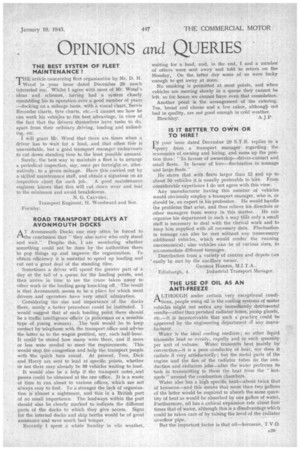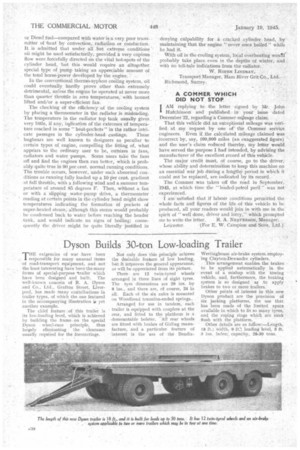OPINIONS and QUERIES THE REST SYSTEM OF FLEET MAINTENANCE ?
Page 31

Page 32

If you've noticed an error in this article please click here to report it so we can fix it.
THE article concerning fleet organization by Mr. D. H.
Wood in your issue dated December 29 much interested me. Whilst I agree with most of Mr. Woo,d's ideas and schemes, having had a system closely resembling his in operation over a good number of years —docking on a mileage basis, with a visual chart, Servis Recorder charts, tyre charts, etc.—I cannot see how he can work his vehicles to the best advantage, in view of the fact that the drivers themselves have tasks to do, apart from their ordinary driving, loading and unloading, etc.
I will grant Mr. Wood that there are times when a driver has to wait for a load, and that often this is unavoidable, but a good transport manager endeavours to cut down standing time to the least possible amount.
Surely, the best way to maintain fleet is to arrange• a periodical inspection, say, once per fortnight or, alternatively, to a given mileage. Have this carried out by a skilled maintenance staff, and obtain a signature on an inspection chart for each job. A good maintenance engineer knows that this will cut down wear and tear to the minimum and avoid breakdowns.
N. G. CALVERT, Transport Engineer, H. Woodward and Sim. Formby.
ROAD TRANSPORT DELAYS AT AVONMOUTH DOCKS AT Avonmouth Docks one may often be forced to the conclusion that "they also serve who only stand and wait." Despite this, 1 am wondering whether something could not be done by the authorities there to pep things up and improve the organization. To obtain efficiency it is essential to speed up loading and cut out a great deal of the standing time.
Sometimes a driver will spend the greater part of a (lay at the tail of a queue for the loading points, and then arrive in time to see the crane taken away to other work or the loading gang knocking off. The result is that Avonmouth seems to be a place for which most drivers and operators have very small admiration.
Considering the size and importance' of the docks there, surely a better procedure could be instituted. would suggest that at each loading point there should be a traffic intelligence officer (a policeman or a sensible type of young woman). The task would .be to keep contact by telephone with the transport office and advise the latter as to the wagon position, say, each half-hour. It could be stated how many were there, and if more or less were needed to meet the requirements. This would stop the congestion and help the transport people with 'the quick turn round. At present, Tom, Dick and Harry are sent to load at specific points, whether or not there may already be 30 vehicles waiting to load.
It would also be a help if the transport notes.and passes could be obtained at the one office. It is a waste of time to run about to various offices, which are not always easy to find. To a stranger the lack of organization is almost a nightmare, and this in a British port of no small importance. The leadways within the port should also be clearly marked to indicate the different parts of the docks to which they give access. Signs for the internal docks and ship berths would be of great assistance and save much bad temper.
Recently I spent a whole Sunday in vile weather,
waiting for a load, and, in the end, I and a number of others were sent away and told to return on the Mondays On the latter day some of us were lucky enough to -get 'away at noon.
No smoking is permitted at most points, and When vehicles are moving slowly in a queue they cannot be left, so for hours we cannot have even that consolation. Another point is the arrangement of the catering. Tea, bread and cheese and a few cakes, although not bad in quality, are not good enough in cold weather.
Bletchley. A.J.P.
IS IT BETTER TO OWN OR TO HIRE?
IN your issue dated December 29 S.T.R. replies to a query from a transport manager regarding the economics of owning and hiring, and sums up the position thus : "In favour of ownership—driver-contact and small fleets. In favour of hire—fluctuation in tonnage and large fleets."
He states that with fleets larger than 12 and up to about 50 vehicles it is usually preferable to hire. From considerable experience I do not agree with this view.
Any manufacturer having this number of vehicles would obviously employ a-transport manager, who is, or should be, an expert in his profession. He would handle the problems that arise, and thus relieve his diredors or other managers from worry in this matter. He can organize his department in such a way that only a small staff is necessary to deal with the clerical work and to keep him supplied with all necessary data. Fluctuation in tonnage can also be met without any unnecessary additional vehicles, which would render the running uneconomical ; also vehicles can be of various sizes, to accommodate different tonnages.
Distribution from a variety of centres and depots can easily be met by the ancillary owner.
GEORGE HARRIS, M.I.T.A.,
Edinburgh, 4. Industrial Transport Manager.
THE USE OF OIL AS AN ANTI-FREEZE LTHOUGH under certain very exceptional condi tions, people using oil in the cooling systems of motor vehicles might not notice any immediately detrimental results—other than perished radiator hoses, pain') glands, etc.—it is inconceivable that such a practice. could be approved by the engineering department a any manufacturer.
Water is the ideal cooling medium ; no other liquid transmits heat so evenly, rapidly and in such quantity per unit of volume. Water transmits heat mainly by convection-Ht is a poor conductor of heat, nor does it radiate it very satisfactorily; but the metal parts of the engine and the fins of the radiator tubes do the conduction and radiation jobs—after the water performs its task in transmitting to them the heat from the " hotspofs " around the combustion chambers.
Water also has a high specific. heat—about twice that of kerosene—and this means that more than two gallons of the latter would be required to absorb the same quantity of heat as would be absorbed by one gallon of water. Furthermore, oil has a cubical expansion rate about four times that of water, although this is a disadvantage which could be taken care of by raising the level of the radiator overflow pipe.
But the important factor isthat oil—kerosene, T.V.O.
or Diesel fuel—compared with water is a very poor transmitter of ,heat by convection, radiation or condUction. It is admitted that under all but extreme conditions oil might be used satisfactorily, provided a very copious flow were foreefully directed on the vital hot-spots of the cylinder head, but this would require an altogether special, type of pump taking an appreciable amount of the total horse-power developed by the engine. :
In the conventional therrno,syphon cooling system, oil could eventually hardly prove other than extremely detrimental, unless the engine be operated at never more than quarter throttle in zero temperatures,. with bonnet lifted and/or a super-efficient fan.
The checking of the efficiency of the cooling system by placing a thermometer in the radiator is misleading. The temperature in the radiator top tank usually gives very little, if any, irLdication of the extremes of temperature reached in some " heat-pockets" in the rather intri
cate passages in the cylinder-head castings. These bugbears are well known to designers as peculiar to certain types of engine, compelling the fitting of, what appears to the ordinary user to be, outsizes in fans, radiators and water pumps. Some users take the fans off and find the engines then run better, which is probably quite true in 90per cent. normal running conditions. The trouble occurs, however, under such abnormal conditions as running fully loaded up a 10 Per cent. gradient at full throttle, with a following wind and a summer temperature of around 85 degrees F. Then, without a fan or with a slipping water-pump drive, a thermometer reading at certain points in the cylinder head might show temperatures indicating the formation of pockets of super-heated steam, although this steam • would probably he condensed back to water before reaching the header tank, and would indicate no signs of boiling; consequently the driver might be quite literally justified in
denying culpability for a cracked cylinder head, by maintaining that the engine "never once boiled" while he had it.
With oil in the cooling system, local overheating woufcf probably take place even in the depths of winter; and with no tell-tale indications from the radiator..
W. ROPER LINDSAY, .
Transport Manager, -Ham River Grit Co., Ltd. Richmond, Surrey.
A COMMER WHICH DID NOT STOP
An replying to the letter signed by Mt. John Hutchinson and published.• in your issue dated December 22, regarding COrnmer mi,leage claim.
That this vehicle did an exceptional mileage as verified at my request by one of the Oommer service engineers. Even if the calculated mileage claimed was .incorrect by, say, 100,000 miles (an exaggerated figure) and the user's claim reduced thereby, my letter would have served the purpose I had intended, by advising the manufacturer of the excellent record of this vehicle.
The major credit must, of course, go to the driver; whose ability and determination to keep this machine on an essential war job dtring a lengthY period in which it could not be replaced, are indicated by its record.
The Commer . was taken off the rOad in September, 194$, at which time the " leaded-petrol peril " was not experienced.
I am satisfied that if labour conditions permitted the whole facts and figures of the life of this vehicle to be produced, all your readers would join in with me in the spirit of "well done, driver and lorry," which prompted me to write the letter. R. A. NEAVERSON, Manager.
Leicester. (For E. W. Campion and Sons, Ltd.)




















































